OLD TESTAMENT READING: JOSHUA 3:1-4:24
THE SECOND MIRACULOUS CROSSING
Joshua had seen a lot in his lifetime. He was born into slavery in Egypt, had witnessed God raising up Moses and providing deliverance of his fellow Jews from their Egyptian oppressors. He witnessed their supernatural exemption from the plagues, including salvation from the sentence of death on the firstborn sons. He himself was the firstborn son of Nun and therefore knew the value of putting faith in God’s plan of salvation. He experienced the miraculous crossing of the Red Sea on dry land and the destruction of the enemy who pursued them. He witnessed the provision of God’s guidance of the cloud by day and the fire by night, the manna from heaven, the revelation of God’s righteousness in the Law, and the establishment of the nation of Israel in a covenant relationship with Yahweh.
Now Moses was dead, and Joshua finds himself as the new leader. He had been appointed for this. The LORD had commissioned him to be Moses’ successor (Deut. 31:23).
As they came to what appeared to be an impassable Jordan River in its flood stage, all Israel looked to Joshua to see what he would do. (The average width of the riverbed is about 98 feet, while the depth ranges from 3 to 13 feet. During flood times, the Jordan swells to a width of one-half mile in certain areas. The Zondervan New Atlas of the Bible reports: ‘Early explorers report that at flood stage certain portion of the river reached a width of almost 1 mile.’)
How would over a million people cross this river? They had no boats to ferry them. It was too deep to ford. They could not swim in the torrent of the floodwaters.
The people looked to Joshua as they had looked to Moses. And Joshua looked to the Lord.
JOSHUA ROSE EARLY TO PURSUE THE LORD’S BUSINESS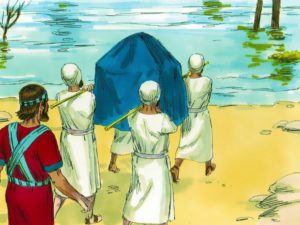
Joshua knew that He needed divine instruction. He needed God’s intervention. Like Moses before Him (Exodus 24:4; 34:4) and King David (Psalm 57:8), Hezekiah (2 Chronicles 29:10) and the Lord Jesus (Mark 1:35), he arose early in the morning to meditate upon God’s Word (Joshua 1:8) and pray. Prayer and meditation upon God’s truth nurture our faith, and without faith, it is impossible to please God (Hebrews 11:6). We are to meditate upon God’s Word both day and night (Joshua 1:8; Psalm 63:6; 77:6; 119:148).
The modern message is “have faith in faith.” (Example: The lyrics from ‘Prince of Egypt’s “When You Believe”: “Who knows what miracles you can achieve when you believe somehow you will, you will when you believe.”) People are led to believe that if you believe hard enough, it will come true. This is the misguided mind over matter metaphysics, New Thought, positive thinking, or Word of Faith folklore.
The Biblical message is “Have faith in God” (Mark 11:22). Faith always takes an object, meaning faith does not look to itself; faith is not a force in itself, it is the activity of transferring our trust to what we know to be a trustworthy object. No one is more trustworthy than God and nothing more trustworthy than His Word.
When people would express their appreciation to the late preacher John Stott, complimenting him on the delivery of a message, he developed a habitual response to what is often an awkward moment for a preacher who is so aware of his inadequacies in the midst of God’s sufficiency. He would reply, “What are you going to do about it?” In other words, don’t just appreciate the word. Take action. Faith leads to action.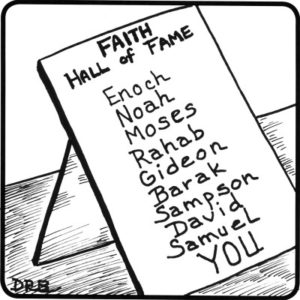
When we look at “Faith’s Hall of Fame” in Hebrews 11, they are all people who did something with what they heard. Faith comes by hearing and hearing the message of Christ. (Romans 10:17). They acted because they believed God. They gave evidence that they believed God by doing what He told them to do. And what He told them to do was not their own idea. Abel offered what God required. Noah built the ark He was told to build. Abraham left his comfort zone in the idolatrous city, Ur of the Chaldees, and headed out to the Promised Land because God told him to. These heroes of faith did what they were told, exhibiting faith in God’s promise.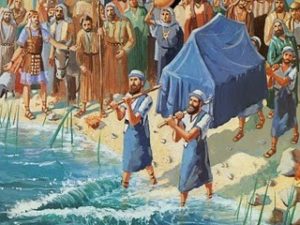
Joshua will do the same. He follows instructions and gives deference to the ark of the covenant, which represented the presence of God’s testimony in Christ. They were told to keep a distance of at least 1000 yards from the ark. This command for ‘safe distancing’ would have ensured maximum visibility of the ark before all the people.
The ark of the covenant, which we have seen is a constant type of Christ, must lead the way and be kept in full view, with 2000 cubits distance. Do we take precautions to be sure that others can see Christ more clearly?
The ark must be born on two staves of wood by the Kohathites who are to stand in the middle of the river allowing for the children of Israel to cross over on dry ground (3:17). When we, as New Testament believer-priests, take up our cross, our personal identification with Christ’s death, burial, and resurrection, and stand secure in the midst of the trial, we can make way for others to cross the river as well. 
The officers remind the people not to be cock-sure, familiar, or presumptuous but give reverence and undivided attention to what God is saying and doing. “FOR YOU HAVE NOT TRAVELED THIS WAY BEFORE” (3:4).
The priests were to go to the edge of the water and STAND by faith IN THE JORDAN. They had to get their feet wet in this matter. They had to trust God personally in order to lead the way for others.
Notice the admonitions: CONSECRATE YOURSELVES (v.5) COME CLOSER. LISTEN (v.9). The children of Israel were to purify themselves for three days and then cross the Jordan.
God promised that the water would be cut off and that the people would be able to cross over while the priests carrying the Ark of the Covenant stood in their place in the Jordan. It is because Christ (the ark of the covenant) stood in our place in the Jordan (natural life of man flowing to its end, the dead Sea; Roman 6:23) that we can pass from death to life and enter into what has been promised to us in Him.
God also promised that He would remain among them and would win their battles, driving out the enemy according to His Word. (3:10).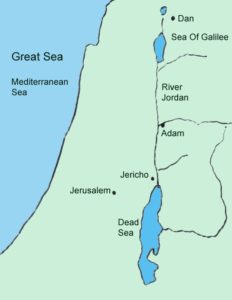
The children of Israel go to sleep that night having heard Joshua’s promise: “Tomorrow the Lord will do wonders among you.” (3:5)
On the following day, the miracle happens. The children of Israel cross over the Jordan River as they had crossed the Red Sea on dry ground.
Notice the prophetic picture: The waters were cut off a great distance away “at Adam, the city that is beside Zarethan.” The finished work of Christ (the last Adam) completely cuts off the flow of the natural inheritance of the fallen First Man, Adam (3:16).
It is only on the basis of the finished work of redemption (figured by the ark) that God’s elect can cross over.
The crossing of the Jordan prefigures our own deliverance through identification with Christ in His death, burial, and resurrection. The Jordan speaks of the natural man. The river travels some 200 miles from its source in Mt Hermon, twisting and winding as if attempting to avoid its destination in death- the Dead Sea. We know that Jesus’ baptism by John at the Jordan prefigured his identification with Adam’s race (the natural man) in death, burial, and resurrection.
JOSHUA 4 – TWELVE STONES TELL THE STORY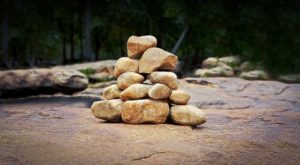
Chapter 4 gives us a prophetic picture of how God reckons those who believe Him, those who take action relying on God’s Word. Twelve stones, symbolizing the twelve tribes, God’s people, are put into (baptized) the Jordan River, picturing identification with the death of Christ. The twelve stones are placed into the watery grave of the Jordan even as believers are reckoned as being put (baptized) into Christ. From God’s point of view, they are securely positioned, risen, and seated in Christ in the heavenly places.
Romans 6:4 4 Therefore we were buried with Him by baptism into death, in order that, just as Christ was raised from the dead by the glory of the Father, so we too may walk in a new way of life.
Ephesians 2:6 6 Together with Christ Jesus He also raised us up and seated us in the heavens,
Even though two and a half tribes would choose to settle on the close side of the Jordan, all twelve stones are to be reckoned as having crossed over and positioned at Gilgal in the Promised Land. This is a wonderful picture of Positional Truth. Even if we fail to experientially settle into the Promised Land fully, God reckons on us “in Christ” as having passed “clean over Jordan”.
Joshua 4:1 (KJV) 1 And it came to pass, when all the people were clean passed over Jordan…
When all the nation of Israel had crossed over on dry ground, Joshua commanded that one man from each of the twelve tribes were to get a stone from the midst of the Jordan (now that it was suddenly made dry) and make a memorial on the Promised Land side of the river.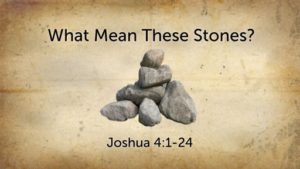
Joshua 4:21-24
He said to the sons of Israel, “When your children ask their fathers in time to come, saying, ‘What are these stones?’ 22 then you shall inform your children, saying, ‘Israel crossed this Jordan on dry ground.’ 23 “For the LORD your God dried up the waters of the Jordan before you until you had crossed, just as the LORD your God had done to the Red Sea, which He dried up before us until we had crossed; 24 that all the peoples of the earth may know that the hand of the LORD is mighty, so that you may fear the LORD your God forever.”
TODAY’S NEW TESTAMENT READING: LUKE 14:7-35
THE PARABLE OF THE GUESTS
Jesus exposes the ‘me first’ attitude that resided in the hearts of many at the meal he was attending. He knows what resides in the heart of fallen man. His parable illustrates that in the future, those who exalt themselves will be abased. There is a need for a humble response to the higher and greater invitation of the Gospel, the invitation to the Marriage Supper of the Lamb, which outshines all prestigious banquets that may be known in this life. We should recognize the obvious truth about ourselves (we are sinners in need of saving grace). To promote ourselves to the head of the table will only lead to our own eventual shame.
Luke 14:11 11 For everyone who exalts himself will be humbled, and the one who humbles himself will be exalted.”
A man reclining at the dinner table with Jesus makes a presumptuous statement that Jesus corrects. The guest assumes that everyone will eat bread in the kingdom of God and most likely presumptuously thinks that he himself will be doing so, without checking his own responsiveness to God’s call to salvation on Christ’s terms.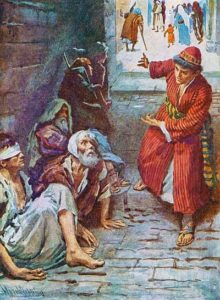
Jesus tells the parable of a great dinner in which all those who were invited refused, making excuses – one needed to attend to checking out his real estate investment, another had to put to test his livestock investment; another excused himself because he was newly married and needed to give more attention to his wife. The master of the feast then turned to his slave and commanded him to fill his house with the poor, crippled, blind, and lame, and then go out to the highways and get the transients, and those sleeping on the roadside, that his house be full.
DISCIPLESHIP REQUIRES AN HONEST ASSESSMENT OF OUR NEED FOR CHRIST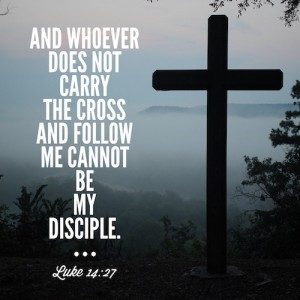
Jesus makes a claim on people’s affections that would be considered blasphemous were it not for the fact that He was God. He demands supremacy in human allegiance and affections equivalent to worship. The Great Commandment is to love the Lord your God with ALL your heart, with ALL your soul and with ALL your mind (Matthew 22:37). Here Jesus is making the same claim on our hearts, souls, and minds. Matthew’s gospel puts Jesus’ call to allegiance this way: “He that loves father or mother more than Me is not worthy of Me, and he who loves son and daughter more than Me is not worthy of Me (Matthew 10:37).
Luke’s gospel expresses the supremacy Jesus is to have in our affections and our calculations this way: “If anyone comes to Me, and does not hate his own father and mother and wife and children and brother and sisters, and even his own life, he cannot be My disciple.”
Jesus, a God-fearing Jew, was conscious of the Torah and His mission to fulfill it (Matthew 5:17). For Him to call for supreme allegiance, above what the Law required for honoring parents, loving one’s neighbor as oneself, is making the claim that He indeed is the God of Moses to whom all honor is due. Discipleship requires a higher and prior commitment to Christ, above all else, even our God-given commitments and affection for parent, spouse, children, siblings, and one’s own life (Luke 14:26).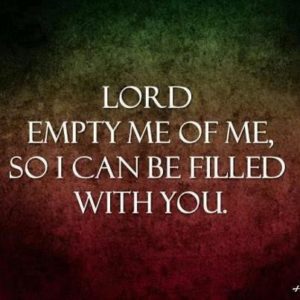
Discipleship is not a calling for an elite group of Christians. Discipleship is the calling for ALL Christians. All Christians are disciples. And in Luke chapter 14, Jesus is describing what a disciple looks like, how he or she thinks and acts. This kind of discipleship is what true Christianity looks like. Jesus warns us of the deception of thinking that we can be a Christian without Christ as our all in all. It would be as foolish to do that as to take on a public construction project costing millions, like building a central tower in town, or a public high school with your own private funds from a minimum wage salary, or going to war against an army that is twice the size of your own (Luke 14:28-32).
In verse 32, he explains that a wise builder will honestly assess his own condition and resources before taking on such a project. For him to foolishly go ahead with it, banking on his own resources would lead to bankruptcy and shame. In the case of warring armies, a wise general knows when to seek for terms of peace. We cannot be disciples without admitting our own bankruptcy. In ourselves, we cannot live the Christian life. Only Christ can. Therefore, we are to surrender all that we are and all that we have to all that He is.
We cannot lay hold to our own possessions and rely upon our natural endowments to be a disciple. We must forsake all and lay hold of Him, recognizing our need for all that He is and all that He has to give. He is our all-sufficient Savior!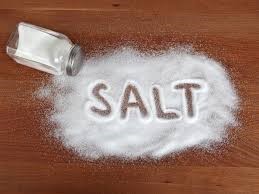
The final picture is that of salt. Salt is a precious commodity and was used to barter for services. We hear the expression of a person being ‘worth his salt’. The word ‘salary’ comes from salt, ‘salarium’. People sometimes received their wages in the form of salt. Salt is good and has value for seasoning, preserving, stirring thirst, raising blood pressure! But if it is not true salt, but counterfeit salt, of what good is it? So is a professing Christian who lacks the life of Christ. It may make an appearance to be salt but it exhibits none of the qualities to prove its saltiness.
TODAY’S READING FROM THE BOOK OF PSALMS: PSALM 80:1-19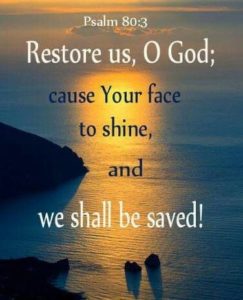
Here is a prayer to the God of Israel, who dwells in the heavenly tabernacle, prefigured in the earthly tabernacle with the ark of the testimony. The Psalmist is asking for rescue. (Jesus’s name means: ‘God to the rescue’ and is the ultimate answer to this kind of prayer.)
Three calls from Asaph to ‘restore us’:
Psalm 80:3 3 O God, restore us and cause Your face to shine upon us, and we will be saved.
Psalm 80:7 7 O God of hosts, restore us and cause Your face to shine upon us, and we will be saved.
Psalm 80:19 19 O LORD God of hosts, restore us; Cause Your face to shine upon us, and we will be saved.
The call to be restored demands the propitiation, redemption, ransom, and regeneration sanctification and glorification that is found in the gospel of Jesus Christ.
The Psalmist reminds the Lord of their history and the great work that He has done to rescue them in the past. They have slipped from their condition and need to be restored. This echoes the prayer for revival.
Verse 18 points to Christ, our hope for full restoration:
Psalm 80:17-18 17 Let Your hand be upon the man of Your right hand, Upon the son of man whom You made strong for Yourself. 18 Then we shall not turn back from You; Revive us, and we will call upon Your name.
Restoration is pictured as the light of the Lord’s countenance shining upon us through the finished work of Christ.
2 Corinthians 4:6 6 For God, who said, “Light shall shine out of darkness,” is the One who has shone in our hearts to give the Light of the knowledge of the glory of God in the face of Christ.
2 Corinthians 3:18 18 But we all, with unveiled face, beholding as in a mirror the glory of the Lord, are being transformed into the same image from glory to glory, just as from the Lord, the Spirit.
This is also pictured in the blessing that Moses gave Aaron to give to the priests.
Numbers 6:22-26 22 Then the LORD spoke to Moses, saying, 23 “Speak to Aaron and to his sons, saying, ‘Thus you shall bless the sons of Israel. You shall say to them: 24 The LORD bless you, and keep you; 25 The LORD make His face shine on you, And be gracious to you; 26 The LORD lift up His countenance on you, And give you peace.’
TODAY’S PROVERB- The Pathway of Deathless Life is what we find in Jesus- THE WAY, THE TRUTH AND THE LIFE (JOHN 14:6)
Proverbs 12:27-28 27 A lazy man does not roast his prey, But the precious possession of a man is diligence. 28 In the way of righteousness is life, And in its pathway there is no death.
PRAYER FOR THE NATIONS– Please continue to pray for China.
PRAYER: Gracious God and Faithful Deliverer, thank You for reminding us that You are with us, leading us, guiding us, and instructing us. Help us to keep Your Holy Son, Jesus, ever in our view, and may we not obstruct others from seeing Him. We recognize that through our faith-union with Him and His death, burial and resurrection, we are positioned in Him before Your throne, far above all principalities and powers and have been qualified to receive our inheritance in Him. We do not take Your blessings for granted. We delight in the merciful light of Your countenance and the peace wrought for us by our Savior’s work on the cross. Help us walk in the light as He is in the light, In Jesus’ Name. Amen.
Pastor David
